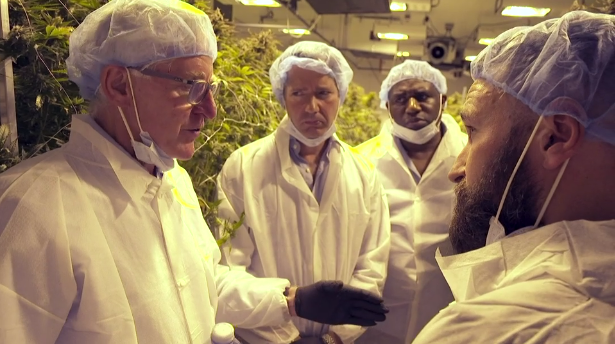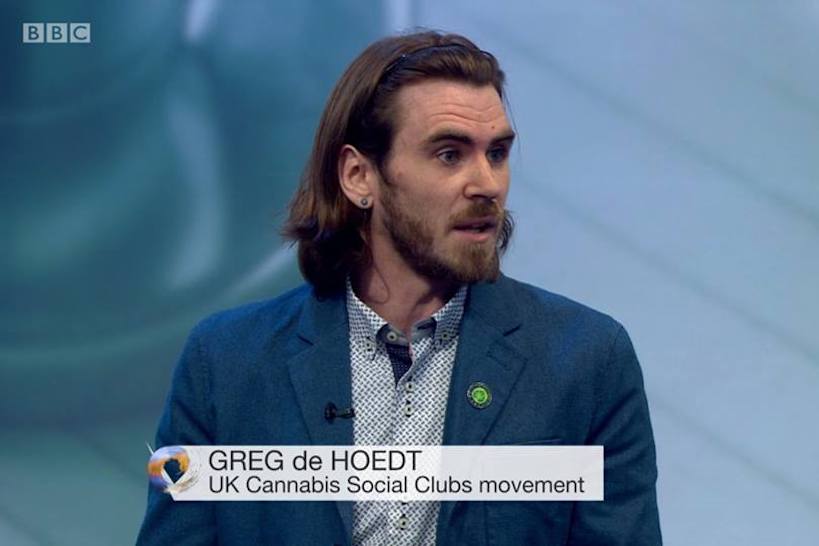UK Cannabis Social Clubs chairman Greg de Hoedt has told BBC Radio West Midlands that “we need legalisation now” after three MPs who visited Canada for a BBC documentary said they expected cannabis use to become legal in the UK within five to 10 years.
Liberal Democrat Sir Norman Lamb, Conservative Jonathan Djanogly and Labour’s David Lammy – who changed his mind and now backs legalisation – visited Canada on a fact-finding mission to see how the legalisation of cannabis use had played out there.
But Greg told radio host Paul Franks: “It’s a really privileged position to say ‘we’re going to legalise it in five or ten years’ – what about the people suffering now. I’ve got Crohn’s disease, I’ve not got a prescription yet and doctors are still telling me it’s a placebo when there’s plenty of evidence out there to show that it supports people like me.
“It should be done this year. We need to legalise now. People are suffering, people are being arrested, their homes are being raided, they’re being put through the court system. That’s not on, they’re growing cannabis for themselves. We need to look at the cannabis social club movement in the UK, with people growing cannabis for themselves and their community members and sharing it at fairtrade costs. We need to create a situation where we are providing access for these people to have licences and treated as legal businesses so that they are not left in a grey area or the black market when people who have got £50-100m come along and buy a licence and are given free reign when people who have been fighting and campaigning for it and suffering at the hands of prohibition are left in the mud.”
Read more: Illegal cannabis is ending our pain. Why aren’t we supporting who grows it?
Greg told Paul that “a lot of people have been disappointed” with the way cannabis legalisation has gone in Canada so far. “A lot of the dispensaries that were operating in Toronto, Vancouver and other cities, they’ve been shut down; a lot of them haven’t been given the opportunity to move into the legal industry, and it’s kept them in the black market. These are the people who actually campaigned for legalisation. That large call for legalisation, why we needed it, who it would benefit and what harms would be prevented if it was legalised, a lot of that still needs to come true.
“No one should just assume that people growing cannabis are people who are dangerous and nasty and doing it for ill-gotten gains. Normal people are growing it, normal people are being arrested. They’re providing cannabis for people now.
“Corporations have the resources to grow it on a large scale. But they don’t care about the way it is grown. We need to regulate commercial cannabis but we need to make sure that people have got the right to grow at home and I think we need to do that before giving licences to commercial companies to make millions of pounds.”

Asked if legalisation in Canada had brought down the potency of the cannabis available to the public, Greg explained that this was “a bit of a myth”: ““Recent studies have show that UK street cannabis is now 14% THC. Whereas the cannabis available in Canada through licenced dispensaries is 22% THC. There’s different types of cannabis available so people have got a choice. To say that legal cannabis is going to see the strength come down is a little bit of a myth. We need to understand cannabis a little bit better and why people like it. People are going to have a choice, whether that’s for a high CBD or high THC product, or something in between.”
Asked if the clubs grow for medicinal or recreational, Greg said: “It’s grown for use. It’s none of anyone else’s business if people are using it for medical or recreational reasons. The point is, it’s not harming them, it’s not harming anyone else, and we need to create some legal provisions for people to act in this way when they’re not doing it for criminal reasons. People have created a solution for a problem made by prohibition. People forced to get cannabis on the streets are being exposed to all sorts of dangers. I’ve been mugged before when I came out of hospital.
“I was given two years to live in 2010. I was given chemotherapy, they wanted to take out my intestines. It wasn’t a good prognosis for me at the age of 22. I went to the US, I got access to cannabis oil from people who grew it at home, and I’m still alive nine years later. I know that people can responsibly grow cannabis at home. They can share it and they can run cannabis businesses. Those people need to be given the right to do so properly. We need to listen to those communities before we ask how much legalisation can make big business.”
In the BBC documentary, Piper Courtenay, a journalist for a weekly newspaper, says that technically illegal cannabis providers are still providing the best cannabis “because they genuinely care about growing good craft cannabis”.

State limits on fully licensed products mean there’s still a “grey” market for things like edibles and other cannabis products.
Lammy said that the trip had converted him to backing legalisation: “I want the market legalised, regulated and taken away from crime gangs, for young people not to be criminalised by use and properly educated,” said the Tottenham MP. “I want to see the strength of the stuff reduced, labelled and properly organised in this country.”
Lamb took some cannabis oil before the flight home and said that he “slept incredibly well. I actually slept through breakfast.”
While Lamb – who has led calls for reform in parliament – and Lammy predicted legalisation in five to 10 years, Djanogly, Conservative MP for Huntingdon, said: “I think we have got a lot to learn before the legalisation of recreational cannabis, which I think will happen at some point,” Jonathan Djanogly told us. I think we’re on a 10 to 15 year cycle which would mirror what has happened in Canada.”
The UK cannabis campaign for the right to grow needs your support.





Comments (2)